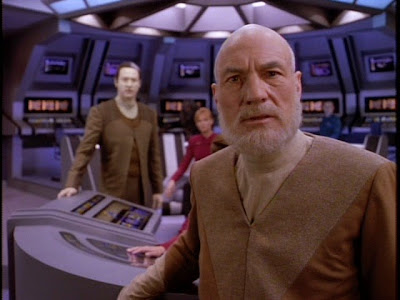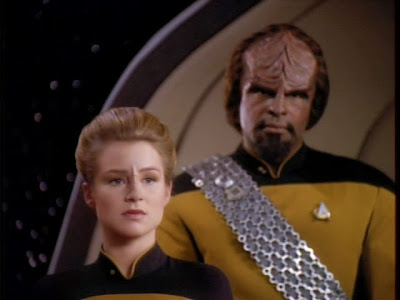 |
| Picard is jumping back and forth through time... |
Jean-Luc Picard has become unstuck in time.
He is jumping between three time periods: The present; the past, at the very point when he first took command of theEnterprise; and more than 25 years in the future, when he is an old man who has been diagnosed with Irumodic Syndrome, a degenerative neurological disorder. The time jumps happen at seemingly random intervals; and after a moment of disorientation, Picard feels completely of that time period, with all the memories and characteristics that suit him in that time and place.
In both past and present, a large spatial anomaly has appeared, with the Enterprise sent to investigate. Convinced that the same anomaly must exist in the future, Picard convinces his old shipmates to join him in traveling to the Devron System - a region of space that, in this future, is controlled by a now-hostile Klingon Empire.
That's when Q appears, returning Picard to the Trial of Humanity that was their first meeting, and informing the captain that humanity has been found guilty. [I]"You are to be denied existence. Humanity's fate has been sealed. You will be destroyed." He adds that it is not the Q who will cause humanity's destruction.
The human race will end because of one man: Jean-Luc Picard!
CHARACTERS
Capt. Picard: This story's Picard isn't "present" Picard transported to other time periods; as is spelled out early on, we are jumping between three Picards: the Picard of the present; the younger, less experienced pre-series Picard; and an elderly and infirm Picard. Stewart's performance differentiates these three incarnations. Past Picard was already a seasoned officer, so differences between him and "our" Picard are small and subtle, but there isn't quite the same sense of confidence to him. Future Picard is noticeably different, and it's here that Patrick Stewart gets his most memorable moments. He has the knowledge from the other two time periods, but his mind struggles through the fog of age and illness to make the connections. He sometimes stammers while trying to force out some kind of clear explanation, and he can't quite keep his temper when he sees the others doubting him. It is a great performance, equal to Family and The Inner Light as Stewart's very best.
Riker: The Riker of the future has risen to the rank of Commodore. He first seen dismissing the elderly Picard's pleas to investigate the Devron System. By initial appearances, he's become the "pompous bureaucrat" figure. When he re-enters the story in the second half, however, we get a fuller picture. He has made the Enterprise his flagship, saving the old ship from being decommissioned because of his great fondness for it. He may have appeared to have dismissed Picard, but he did investigate - He just didn't want to make public knowledge of a crossing into Klingon territory. He carries bitterness over a feud with Worf, an argument based around the bizarre triangle their present-day counterparts have formed with Troi, but it's clear that he is very ready to make peace with his old friend. Jonathan Frakes is very good in these "future" scenes, reminding us for the first time since The Pegasus how good he can be when given strong material.
Geordi: The "future plot" is kicked off when Geordi visits the elderly Picard. Their banter reveals that Geordi ended up marrying Leah Brahms, and we can see that his visor has been replaced by implants in his eyes, presumably allowing him more normal vision. Even after connecting with Data and Dr. Crusher, Geordi continues to feature prominently throughout the "future" scenes, which goes a long way toward making up for the sparse material he's been afforded the past two seasons (this season especially).
Dr./Capt. Crusher: The future timeline that we see is one in which Picard and Crusher married... and then divorced. Beverly continues to have fondness for her ex-husband, though, keeping the Picard name and agreeing to transport him to the restricted sector. When Geordi admits to her that he's not certain this isn't just a delusion, a result of Picard's neurological disease, she replies that it doesn't really matter. "He's Jean-Luc Picard. And if he wants to go on one more mission, that's what we're going to do."
Tasha: The "past" Enterprise timeline is immediately pre-series, which means Tasha is the Security Chief. With no Riker or Geordi, and with Data still in his early, overly literal stage, this leaves her effectively acting as Picard's First Officer. Denise Crosby gives a much better performance here than was her average, showing her concern over Picard's increasingly strange orders without overplaying it. The moment in which she finally questions Picard, insisting that while they have followed his every order no matter how strange, they need something more from him before putting the ship at risk, is one of the best moments given to a character who got far too few such moments back when she was a regular.
Q: First appears much as he had in Encounter at Farpoint, sitting in scarlet robes on a throne that hovers in the air, mocking Picard while pronouncing judgment against humanity. Unlike in the series' premiere, this is an act he's putting on, keeping up appearances for the Q Continuum. Q is strictly an ally in this episode. He only appears a handful of times; but every time he shows up, he gives Picard some vital clue to push him toward the solution. It's his intervention that allows Picard awareness of the time jumps, giving him a fighting chance to put all the pieces of this temporally fragmented puzzle together. Q reappears at the end, giving Picard congratulations as well as a mix of warning and promise: That the challenge to prove that humanity deserves its place is a "trial (that) never ends." Which is as much a statement of the franchise's own philosophy as a question of this one episode's plot.
THOUGHTS
Coming up with a suitable finale to Star Trek: The Next Generation had to have been a daunting task. By the end of its run, TNG had already become an iconic series - at the time, even overshadowing the original Star Trek (an imbalance that would slowly correct itself in the following decades). It was a rare genre show whose appeal had extended into the mainstream. Even if its final season had fallen short of the quality that viewers had come to expect, its final bow was not just a television show; it was an Event.
Writers Ronald D. Moore and Brannon Braga turned to literature for inspiration: To Slaughterhouse-Five, Kurt Vonnegut's best-known science fiction novel. In that novel, Billy Pilgrim is a World War II soldier who becomes "unstuck in time" after being taken prisoner by the Germans and transported to a labor camp in Dresden. Throughout the novel, Billy jumps forward and backward between various points in his life, including his own death. There is even a central cataclysmic event: The infamous bombing of Dresden.
The form may be borrowed from Vonnegut, but the spirit is uniquely TNG. Whereas Billy Pilgrim is a very passive protagonist, doing little to affect his situation, Picard insists on acting on his bizarre predicament - with the actions he takes actually creating the very problem he's trying to solve! A common interpretation of Billy's time-jumps is that he's suffering from PTSD and not time-jumping at all. Picard's time jumps are definitely real, with Dr. Crusher medically verifying his story early in the episode, and we learn exactly what (or who) is causing them. It's all part of a puzzle to be solved, with everything made clear once the pieces are put together.
The time jumps allow the finale to look backward at the series' origins while simultaneously giving viewers a look at one possible future for the characters. The series opened with Picard having only recently taken command of the Enterprise before being captured and put on trial by Q. This episode's "past" plot flashes back to immediately before that, with Tasha giving the new captain his first look at the vessel he will come to call home. The present plot shows a crew that trusts Picard without question. The future plot shows a crew that desperately wants to trust him, and at the very least indulges him because of the man he used to be. Meanwhile, the crew of the past isn't quite sure what to make of him, his bizarre orders leaving them quietly wondering if they are now in the care of a madman.
The ending sees Picard finally joining the crew's regular poker game. His presence makes things awkward for a moment. But everyone quickly relaxes as he takes his seat and begins dealing, observing that he should have joined them in this a long time ago even as Troi replies, "You were always welcome." The camera rotates as it pulls back from the poker game, showing the captain and his crew gathered at a round table, like a futuristic court of Camelot. The rotation of the camera move transitions perfectly into the pull-back from the Enterprise itself, making the final fade to black almost cinematic.
A perfectly-judged ending to an ideal series finale.
Overall Rating: 10/10.
Previous Episode: Preemptive Strike
Season Seven Overview
Review Index
To receive new review updates, follow me:
On Twitter:
On Threads:





